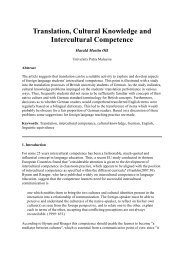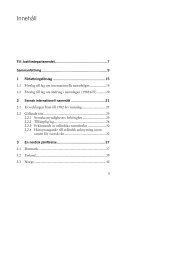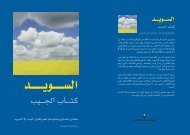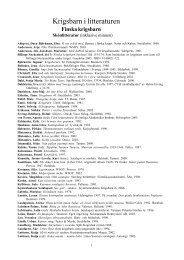Going Home: Deculturation Experiences in Cultural Reentry
Going Home: Deculturation Experiences in Cultural Reentry
Going Home: Deculturation Experiences in Cultural Reentry
Create successful ePaper yourself
Turn your PDF publications into a flip-book with our unique Google optimized e-Paper software.
even true for those who had lived <strong>in</strong> English speak<strong>in</strong>g countries like England, Ireland, and<br />
Australia. Reports <strong>in</strong>cluded the need to "become adjusted to the sound of American voices<br />
aga<strong>in</strong>," and that "the Queen’s English was better, softer, and more quiet than ours." This<br />
difficulty <strong>in</strong> speak<strong>in</strong>g English seemed to be a greater concern for those who were home fewer<br />
than four years. Older respondents did not identify this issue. Of the problems <strong>in</strong> speak<strong>in</strong>g<br />
English, most of the difficulties were reported <strong>in</strong> speak<strong>in</strong>g on religious topics. This is<br />
certa<strong>in</strong>ly understandable as this was the major topic of conversation throughout the mission<br />
experience. One respondent six years removed from his mission experience claimed that he<br />
still had trouble discuss<strong>in</strong>g religious topics <strong>in</strong> English.<br />
Adaptation’s proposition of deculturation, then, was not supported by the data. Over 85% of<br />
the respondents identified hav<strong>in</strong>g little or no trouble reenter<strong>in</strong>g United States culture. The<br />
respondents who did mention difficulty did not mention it <strong>in</strong> terms of the foreign culture, but<br />
<strong>in</strong> terms of the missionary culture. This was identified <strong>in</strong> two ways. First, the structure of<br />
mission life accounted for the majority of difficulty upon reentry. The lack of structure upon<br />
return <strong>in</strong>cluded not be<strong>in</strong>g with a companion constantly and the oversight of one’s activity<br />
(supervision), for example. Second, no responses acknowledged foreign cultural<br />
characteristics that made reentry more difficult. In fact, several respondents identified either<br />
foreign cultural characteristics or their time <strong>in</strong> that culture as be<strong>in</strong>g helpful <strong>in</strong> the return<br />
process. But by far, the most discomfort occurred when respondents attempted to return to<br />
normal social activities, <strong>in</strong>clud<strong>in</strong>g school, work, and especially dat<strong>in</strong>g.<br />
There were evidences that elements of the home culture had been forgotten. These <strong>in</strong>cluded<br />
language, especially concern<strong>in</strong>g religious topics, and some skill elements of cultural<br />
function<strong>in</strong>g, such as be<strong>in</strong>g "rusty" at social skills. The responses were not overwhelm<strong>in</strong>g and<br />
not forceful enough to warrant buoy<strong>in</strong>g one’s unlearn<strong>in</strong>g. This was evidenced by the massive<br />
reports of no problems adjust<strong>in</strong>g at all to the reentry. These f<strong>in</strong>d<strong>in</strong>gs agree with Dunn and<br />
Heffelf<strong>in</strong>ger’s (1987) f<strong>in</strong>d<strong>in</strong>gs regard<strong>in</strong>g feel<strong>in</strong>gs of returned missionaries upon immediate<br />
return. They found that the majority of respondents felt positive about the process. There was,<br />
however, one difference. They described a slightly higher number of returned missionaries<br />
who self-reported feel<strong>in</strong>gs of culture shock.[3] If deculturation was to be demonstrated by this<br />
study, one would have expected to see more problems upon reentry.<br />
In sum, significant feel<strong>in</strong>gs of deculturation were not found <strong>in</strong> this study. There may be three<br />
reasons for this f<strong>in</strong>d<strong>in</strong>g. First, perhaps this is because the participants used with<strong>in</strong> this study<br />
did not have adequate time to fully adapt to their new culture. Kim (2002) argued that crosscultural<br />
adaptation is a lifelong process. The longer the sojourner stays with<strong>in</strong> the host culture<br />
the more deculturation occurs. A person, then, who resides <strong>in</strong> a host culture for ten years will<br />
experience more deculturation than the person who stayed 2 years. Second, maybe the person<br />
who knows she or he will return home at a specific time can delay deculturation or elim<strong>in</strong>ate<br />
it altogether. These would be <strong>in</strong>dividuals who are just "wait<strong>in</strong>g it out" with no motivation to<br />
adapt to the host environment. Third, it is possible that deculturation does not really occur.<br />
Kramer (2002) used hermeneutics to argue that our <strong>in</strong>tercultural experiences fuse with<strong>in</strong><br />
previous experiences, perhaps even comb<strong>in</strong><strong>in</strong>g <strong>in</strong>to someth<strong>in</strong>g altogether different from each<br />
culture. <strong>Cultural</strong> experiences are never lost, only buried deep <strong>in</strong> our social function<strong>in</strong>g. This<br />
idea of fused experiences was reported <strong>in</strong> many participant responses.<br />
Conclusion

















